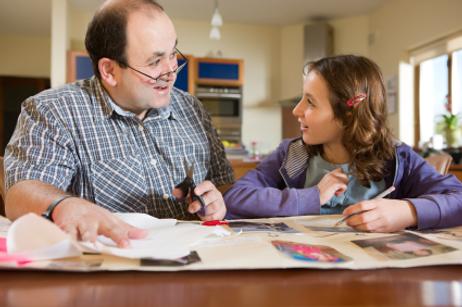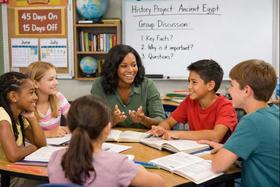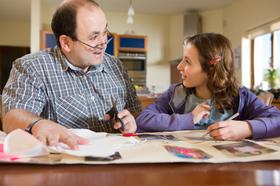In recent years, home-schooled children seem to be “winning.” They have conquered national spelling bees, obtained generous scholarships to elite universities, and have even been crowned beauty queens. If home-schooled kids are enjoying such success, it is understandable why any parent would ask, “Is regular or home school best for my child?”
Like many questions about your child’s education, this particular one does not have an easy answer. It is important to consider many factors before deciding whether your child should stay at home to learn or should be sent to a regular public school.
Home environment vs. school environment
For many advocates of either homeschooling or public school education, the environment offered by either situation is the determining factor as to whether a child should be home-schooled or sent to a regular public school.
The calm, safe environment of home school
Proponents of homeschooling believe that children thrive better in a safe, comfortable environment with which they are familiar. Ironically, so do advocates of public schooling.
However, home-schoolers believe the home is the safest, most secure environment in which a child can learn. At home, a child does not have to deal with peer pressure or with fitting in with the popular cliques. A child can just “be.” This gives the child the opportunity to focus on the lessons being taught and on the educational expectations required of him or her.
Orkid Jalali offers her take on the pros and cons of homeschooling your children.
Home-schooled students do not have to worry whether they are wearing the right clothes, the right shoes, or are shopping at the right stores, or playing the right video games. Since there are (usually) no other children around, home-schooled children learn in a relatively calm, peaceful environment, and – most importantly – they usually have the opportunity to work at their own pace and in their own style. For some, that spells the difference between success and failure.
The critical social component of regular school
Regular public school classrooms are not, by nature, relatively calm environments, especially at the elementary school level. However, that does not mean a student cannot thrive in such an environment. In fact, supporters of regular public schooling argue that the chaos of the classroom is actually what children need to succeed.
Humans are social creatures. That is the belief of many regular public school proponents. Children should interact and work with one another in order to build real, vital skills needed in the real world. For example, the advocates of regular public schooling believe that learning the reading process can certainly happen effectively at home. After all, they say, most kids do learn to read at home. However, the goal of public education is not to teach students simply how to read, solve math problems, or to solve scientific equations. If that were the case, homeschooling would be the best option for everyone.
Carrie and Claire answer questions about being homeschooled vs. attending public school.
The mission of regular public schools, the supporters argue, is to teach kids those skills – and then how to use and apply them through meaningful, necessary interactions with their peers and teachers. That, in essence, is the focus of many regular public schools: relationships. Those relationships can only truly be formed in regular schools. Students can only truly learn how to problem-solve with their peers if they are in a regular public school. Students can only learn how to handle and overcome peer pressure if they are faced with it in a regular school.
Of course, this attitude held by many supporters of a regular public school may suggest that actual “book” learning is not as important as learning how to deal with others, but only you can decide which is more important to your child. Both environments clearly offer opportunities for children to learn, but only you can choose which kind of learning is most vital to you and your family.
Along with the environment in which they learn, students (and their families) also have to consider what they are going to learn. Homeschooling and regular public schooling have different philosophies about these elements as well.
Home curriculum vs. School curriculum
How children learn is a major factor in determining whether your child should stay at home or should go to school. Home-schooled children tend to learn through individual experience, and maybe that is best for your child. Regular public schooled children learn through relationships, and that may be what your child needs. Clearly, this is one major difference between the two philosophies. Another vital component, though, is what they learn, and like before, there are significant differences between the two camps.
The Rockstar Homeschooling Mom explains her curriculum choices.
For the most part, children learn the same basic skills, whether they are home-schooled or taught at a regular public school. They all learn to read, write, and solve basic math problems. Both sides can agree that is a good foundation. However, it is beyond this common foundation that home school and regular school differ. With this in mind, you must evaluate where you want your children’s education focus to be.
Customizing your child’s education with home school
Parents who home-school their children generally get to decide by themselves the focus of their child’s education. The curriculum at can be developed on the passions of the parents, or for what the child has a natural curiosity. In general, that is why most home-schooled children receive some type of religious instruction at home. The parents believe the teaching of religion or spirituality should be incorporated into education, and that is why many choose to teach their children at home.
This does not mean you can teach your kids at home only if you are going to teach them religious-based lessons. Home-schooled curriculum can take the shape of whatever the parent most wants to teach his or her child.
Exposing your child to a plethora of ideas and concepts
Regular public school is different, of course. Public schools, for the most part, base their curriculums on state standards, and the lessons are geared so the students can reach and surpass those standards. There is usually not a lot of time to cover material in-depth, but students are exposed to a broad range of ideas and concepts.
There-in stems the major difference between the curriculums: the home curriculum usually takes fewer ideas to a deeper level, while the school curriculum usually takes more ideas and tries to connect them with one another, hoping to show the students the big picture. Again, only you can decide which is the best approach for your child.
Conclusion
Home-schooling and regular public schooling each has advantages and disadvantages. One may offer a more controlled environment for your child, while the other may expose him or her to a world of ideas you could not possibly imagine. You may find it difficult to choose between the two. Making the right choice depends upon how your child learns, and what you would like him or her to learn. Keeping the best interest of your child in mind makes the decision clearer.
Questions? Contact us on Facebook. @publicschoolreview














